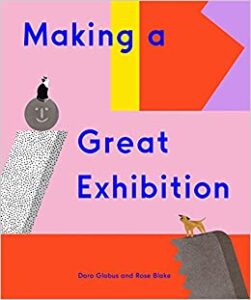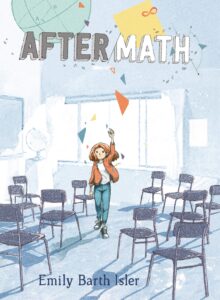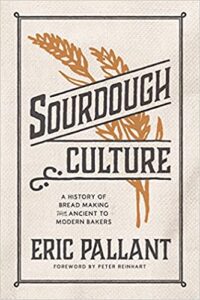“You Just Have to Read This. . .” Books by Wesleyan Authors Globus ’05, Isler ’01, and Pallant ’80
In this continuing series, Annie Roach ’22, an English and Italian studies major from Northampton, Mass., reviews alumni books and offers a selection for those in search of knowledge, insight, and inspiration. The volumes, sent to us by alumni, are forwarded to Olin Library as donations to the University’s collection and made available to the Wesleyan community.
 Doro Globus ’05, Making a Great Exhibition (David Zwirner Books, 2021)
Doro Globus ’05, Making a Great Exhibition (David Zwirner Books, 2021)
In this charming and colorful picture book, author Doro Globus ’05 and illustrator Rose Blake collaborate to introduce the art world to children, delving into the lives of everyone from painters and sculptors to art handlers and museum curators. The story is well-attuned to the diversity of artists and their art, showcasing a variety of mediums and styles and paying great attention to the people in the art world who work behind the scenes, like communications managers and museum guards. As all successful children’s book authors must be, Globus and Blake are adept at diving into the minds of children and answering the questions their young minds might ask about the art world.
Replete with friendly characters (like sculptor Viola and curator Cliff) and eye-catching illustrations, the book is the perfect introduction for any young folks interested in the inner workings of any part of artistic production or display, and as a bonus, is equally fascinating for adults!
Doro Globus ’05 is a children’s book author and managing director of David Zwirner Books, a publishing house that focuses on publishing high-quality art publications. She has worked in arts publishing for over 15 years and edited a number of notable books.
 Emily Barth Isler ’01, After/Math (Lerner, 2021)
Emily Barth Isler ’01, After/Math (Lerner, 2021)
In her touching middle grade debut, Emily Barth Isler ’01 manages to tackle heavy topics with grace and nuance, while still being in touch with the younger minds of her intended audience. The novel tells the story of 12-year-old Lucy, who has just moved to Queensland, Virginia, from Kenton, Maryland. While any move can be harrowing, this one presents even more challenges for the precocious, math-loving narrator Lucy: her younger brother Theo recently died after suffering from a heart defect, and the town to which she is moving underwent a tragic shooting a few years before. As Lucy struggles through the tough transition—juggling her own grief with the grief of her new classmates and community—she turns to math, her favorite subject, for solace, comforted by its reliability and unchangeability.
Despite the gravity of the topics at hand, Isler manages to create a story that is ultimately enveloped in hope and love. For younger readers hoping to make sense of some of the darker sides of the world, it is a deftly handled and optimistic portrait of what it might mean to find comfort and courage in the midst of tragedy.
Emily Barth Isler is a children’s lit writer and a beauty and wellness editor. A former child actress, she has written award-winning episodic television for the web and several personal essays. After/Math is her debut middle grade novel. She lives in Los Angeles with her family.
 Eric Pallant ’80, Sourdough Culture (Agate, 2021)
Eric Pallant ’80, Sourdough Culture (Agate, 2021)
Since the beginning of the pandemic, the process of making bread has become a regular source of comfort in many people’s lives. Many an Instagram post has proudly displayed a gorgeous loaf of sourdough, proclaiming baking bread as “life-saving.” But the culture of bread-making—and its link to human survival—is nothing new, as Eric Pallant points out in his new book, Sourdough Culture. In fact, sourdough—its origins, science, and flavor—go back hundreds of thousands of years, even when humans were primarily hunting and gathering as their main source of nutrition.
Pallant’s book is an impressive interdisciplinary study that draws upon the fields of history, archaeology, anthropology, chemistry and more, investigating the origins and science of baking sourdough, how it has changed over time, and its prevalence in our world today. Pallant even weaves in a few bread recipes. At the end of the book, Pallant sums up his project best: “Making good bread is a delicate balance of experimentation, scientific understanding, artistry, and history. The joy comes in eating the results.”
Eric Pallant is a professor of environmental science and the chair of the Environmental Science & Sustainability department at Allegheny College. A passionate amateur baker, he lives in Meadville, Pennsylvania with his family.

